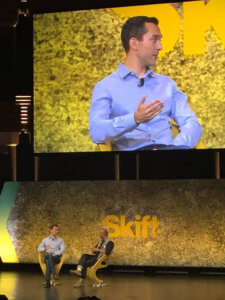
Skift CEO Rafat Ali (right) in conversation with Airbnb co-founder Nathan Blecharczyk (on screen).
Nearly 1,200 professionals from more than 40 countries participated in Skift Global Forum 2017, Sept. 26–27, at Jazz at Lincoln Center in New York City. The sessions for the first day of the global travel industry forum were for the most part interviews with hospitality, destination-marketing, and restaurant leaders, conducted by Skift editors. Here are a handful of their insights with implications for organizers of events (and don’t miss Convene editor Barbara Palmer’s account of a presentation from the second day of the forum).
Don’t overdo tech. Lilian Tomovich, chief experience officer/CMO for MGM Resorts International, said that “companies that have placed too much reliance on digital technology in recent years suffer from human-less customer service. Companies must develop experiences that allow consumers to move seamlessly between human and digital.” We’re in the experience business, Tomovich said, and technology must be an experience enhancer, not a substitute. “Don’t underestimate the value of human interaction.”
But use tech to ‘remove friction.’ Newly appointed InterContinental Hotels Group CEO Keith Barr said IHG is becoming more of a technology company every day. The question for all industries, he said, should be: “How can I use technology to remove friction across the customer journey?” Companies used to invest in tech because it was “interesting,” Barr said. “Now it has to help the customer.” He cited mobile checkout as a case in point.
Make sure everyone knows they are welcome. Los Angeles Tourism & Convention Board President and CEO Ernest Wooden Jr. was joined by Julian Guerrero Orozco, vice president of tourism at ProColombia, and Lina Annab, minister of tourism and antiquities for the country of Jordan, on a “superpanel” that addressed marketing travel in an age of uncertainty. Wooden said that L.A. embarked on an “Everyone is welcome” advertising campaign earlier this year in direct response to the “storyline that people are not welcome in the U.S.” The campaign’s paper-airplane commercial — a no-speaking spot — conveys the city’s culture of inclusivity and tolerance and has been seen by 18 million people.
Millennials put a premium on design and experience — at a great value. Geoff Ballotti, president and CEO of the Wyndham Hotel Group, said that even though the company’s brands — which include Days Inn, Howard Johnson, Ramada, and Super 8 — may be “unsexy,” economy is the fastest-growing segment of the hospitality sector. “Sixty percent of check-ins,” Ballotti said, “earn less than $40,000 a year.” A sure way to Millennials’ hearts, he said, is to focus on great design. They want “a great experience at a great value.”

Danny Meyer: ‘We like to eat out — we’re not going to want to stop being with people.’
People care about their food. A lot. “As long as human beings remain tribal creatures,” said Union Square Hospitality Group CEO Danny Meyer, “we are going to crave high touch as well as high tech.” Going into the food-and-beverage business, he said, has become validated as an entrepreneurial pursuit, and there is an “unprecedented level of interest in food.” When Meyer started the Union Square Cafe 32 years ago, he said, “if you saw someone take a picture of their food, you thought they were weird.” Today, those Instagram shots are the equivalent of “wish-you-were-here” postcards.
Meyer’s tradition of naming restaurants after where they are located means that he is obligated to care for those communities, and to help spur economic development. “Restaurants,” he said, “are remarkable at placemaking.”
‘Help outsiders feel like insiders.’ Part of Airbnb’s appeal, according to Nathan Blecharczyk, the company’s co-founder and chief strategy officer, is ultimately to “help outsiders feel like insiders,” no matter where they stay. And Blecharczyk loves events. “Events are so interesting to us,” he said. “When there is a well-articulated demand and need, the supply [of Airbnb properties] rises up. If only there could be big events every day.”
